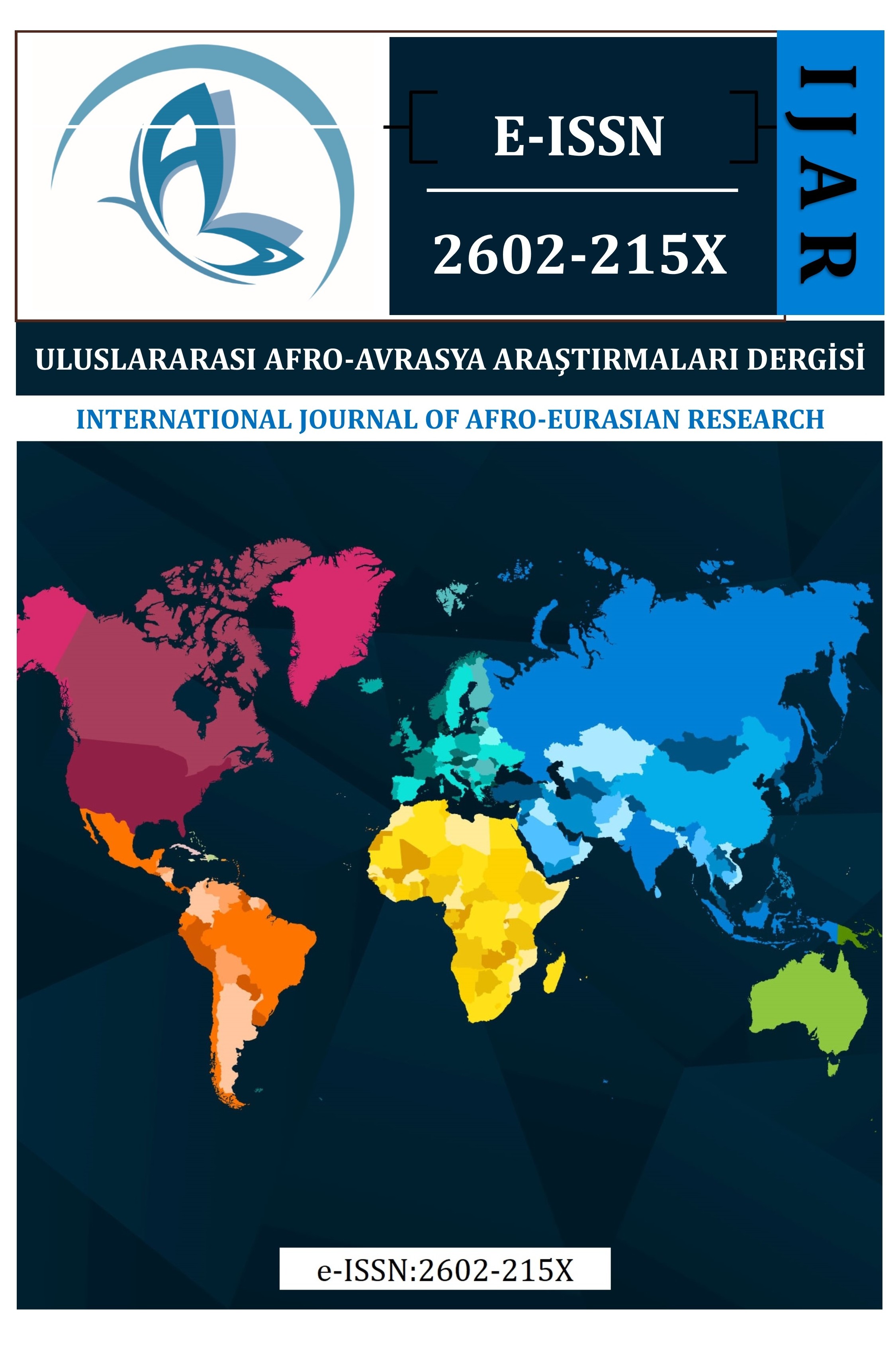SEVKİYAT YÖNETİMİN DEĞERLENDİRİLMESİNE YÖNELİK BULANIK MANTIK YÖNTEMİ İLE ÖRNEK BİR MODEL
Lojistik, Sevkiyat, Bulanık Mantık
A FUZZY LOGIC MODEL PURPOSING EVALUATION OF TRANSPORTATION MANAGEMENT
Logistics, Transportation, Fuzzy Logic,
___
- Acar, D., Aslantaş Ateş, B. (2011) The Relationship Between Supply Chain Activities Costs and Outsourcing. Suleyman Demirel University the Journal of Faculty of Economics and Administrative Sciences, Volume 16, Issue 3, pp. 9 – 27.
- Akçetin, E. (2010) Turkey on the Way of Becoming a Global Logistic Center During the Accession Process to the European Union. Adiyaman University Journal of Social Sciences, Issue 5, December, pp. 1 – 14.
- Çancı, M. and Erdal, M. (2013) Lojistik Yönetimi, İstanbul: Uluslararası Taşımacılık ve Lojistik Hizmet Üretenleri Derneği.
- Emirkadı, Ö. (2015) The Effects on Foreign Trade of Development of Logistics Sector in Turkey, I. International Caucasus –Central Asia Foreign Trade and Logistics Congress Proceedings Book, 1 – 3 October, pp. 99 – 115.
- Ergülen, A. and Deran, A. (2009) The Management of Transportation Cost with Fuzzy Logic Approach and Its Effects On Financial Performance. The Journal of Accounting and Finance, Issue 43, July, pp. 227 – 236.
- Kara, M., Tayfur, L. and Basık, H. (2009) The Importance of Logistics Centers in Global Trade and Turkey. Mustafa Kemal University Journal of Social Sciences Institute, Volume 6, Issue 11, pp.69 – 84.
- Kayabaşı, A. and Özdemir, A. (2008) Üretim İşletmelerinde Lojistik Yönetimi Faaliyetlerinde Performans Yönetimine Bakış: Beklenti - Fayda Farkı Analizi Uygulaması, Atatürk Üniversitesi İktisadi ve İdari Bilimler Dergisi, Cilt 22, Sayı 1, Ocak, ss. 195 – 209.
- Kazan, H., Çiftçi, C. and Hobikoğlu, E. H. (2015) The Fuzzy Logic for the Selection of the Transportation Type a Firm Application, Procedia - Social and Behavioral Sciences, Volume 195, July, pp. 1593 – 1601.
- Mon, D-L., Cheng, C-H. and Lu, H-C. (1995) Application of Fuzzy Distributions on Project Management. Fuzzy Sets and Systems, Volume 73, Issue 2, July, pp. 227-234.
- Neeraja, B., Mehta, M. and Chandani, A. (2014) Supply Chain and Logistics for the Present Day Business. Procedia Economics and Finance, Volume 11, pp.665 – 675.
- Teodorovic, D. and Vukadinovic, K. (1998) Traffic Control and Transport Planning: A Fuzzy Sets and Neural Networks Approach. Massachuetts: Kluwer Academic Publishers.
- Tuzkaya, U. R. (2007) Çok Modlu Taşımacılık Sistemlerinin Stratejik Planlamasında Kritik Faktörlerin Modellenmesine Yönelik Bir Çözüm Yaklaşımı (Doktora Tezi), Yıldız Teknik Üniversitesi Fen Bilimleri Enstitüsü, İstanbul.
- Başlangıç: 2016
- Yayıncı: Hakan ARIDEMİR
KUTADGU BİLİG’DE SIFAT-FİİL KULLANIMI ÜZERİNE KISMİ BİR İNCELEME
DEVRİMLER, KAOS VE İSTİKRAR ARAYIŞLARI İÇİNDE LİBYA: TARİHSEL VE YAPISAL BİR ANALİZ
SEVKİYAT YÖNETİMİN DEĞERLENDİRİLMESİNE YÖNELİK BULANIK MANTIK YÖNTEMİ İLE ÖRNEK BİR MODEL
Aslı ERGENEKON ARSLAN, Ömer Zafer GÜVEN
HATÂYÎ’NİN ŞİİRLERİNDE PROPAGANDİST NİTELİK
TÜRK VE KIRGIZ EDEBİYATINDA AĞITLAR
KADDAFİ SONRASI LİBYA'NIN GÜVENLİK DEĞERLENDİRMESİ
KÜLTÜR COĞRAFYASI BAĞLAMINDA VEZİRKÖPRÜ'DE KENDİRCİLİK VE URGANCILIK
Seyfullah GÜL, Bünyamin KIVRAK
TÜRKİYE ÖRNEĞİNDE YERELDE “İNSANİ” YÖNETİŞİM VE TOPLUMSAL EŞİTLİK BİRİMLERİ
